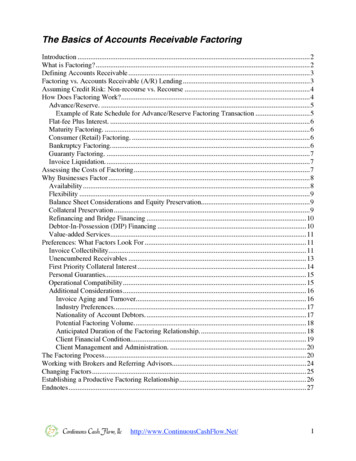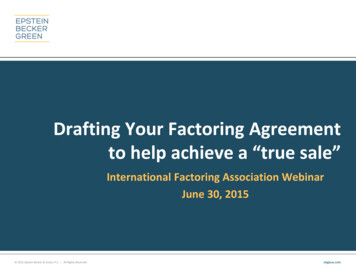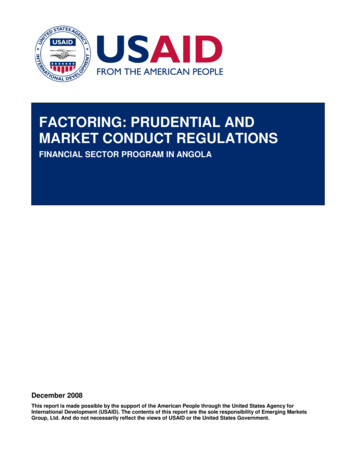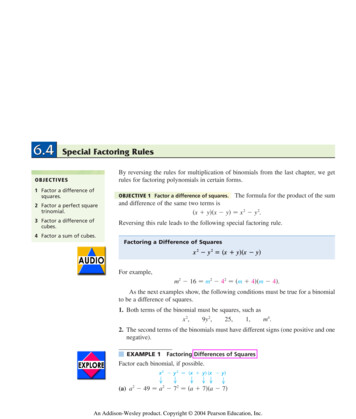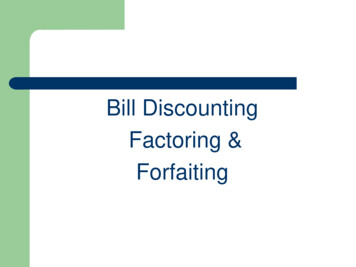
Transcription
Bill DiscountingFactoring &Forfaiting
BILL DISCOUNTING While discounting a bill, the Bank buys thebill (i.e. Bill of Exchange or Promissory Note)before it is due and credits the value of thebill after a discount charge to the customer'saccount. The transaction is practically anadvance against the security of the bill andthe discount represents the interest on theadvance from the date of purchase of the billuntil it is due for payment.
CONDITIONS A bill must be a usance bill.It must have been accepted and bears atleast two good signatures (e.g. of reputableindividuals, companies or banks etc.)The Bank will normally only discount tradebills.Where a usance bill is drawn at a fixedperiod after sight the bill must be accepted toestablish the maturity.
CONDITIONS The discount should be based on real tradebackground.The discount tenor starts from the date ofdiscount and expires at the maturity of thebill.
DIFFERENT TYPES OF BILLSDISCOUNTING Sales bill discounting (Drawer billdiscounting)Supplier bill discounting (Drawee billdiscounting)LC Bill discounting
What is factoring? Factoring is an ongoing arrangement between theclient and the factor, where the sales of goods andservices are made on open account terms and theinvoices for the same are assigned to the factorregularly for the purpose of funding, collection andsales ledger administration.Factoring involves a long-term relationship betweenthe buyer and the seller with the whole turnoverbeing assigned to the factoring company.
Origin Came into existance in the year 1920It was not an organised sector that timeAssociation of British Factors(ABF) came in 1976Nearly 90% of global factoring turnover comes fromUSA & Europian countriesRBI appointed the C.S.Kalyanasundaram Committee(1988)It suggested to start factoring by a bank through itssubsidiary
As of today, Worldwide, factoring volume is more thanUSD 700 billion a yearSpread over nearly 60 countries andcovering more than 1,00,000 businesses.Particularly in developed countries, factoringis an accepted way of conducting business.
Why use Factoring? Through the use of Factoring receivables areinstantly converted into cash leading to improvedcash flows that can help funding of future growth.It facilitate an efficient follow up of payments frombuyers, which is made possible throughrelationships developed by factors with client’sbuyers.Factoring provides credit protection for exportsales which enables to do business with buyerswho are unwilling to open Letters of Credit.Factoring also provides other peripheral servicessuch as advisory services, credit assessment, etc.
What are the types of factoringarrangement? There are basically two types of Factoringarrangements:1) Domestic Factoring- If you are selling inIndia.2) International Export Factoring- If you areexporting form India.
Domestic Factoring The factoring arrangement where all thethree- the factor, the seller and the buyer arein the same country, subject to the samelaws.
International Factoring The factoring arrangement, where the sellerand the buyer are in two different countriesinvolving co-operation between two factoringcompanies, one in the seller’s country(Export Factor) and the other in the buyer’scountry (Import Factor)
Major Types of FactoringNon-Recourse Factoring - It is the mostcomprehensive type of factoring arrangementoffering all types of services namely: Finance Sales Ledger Administration Collection Debt Protection Advisory Services It gives protection against bad debts to the client.In other words, in case the customer fails to pay,the factor will have ‘no recourse’ to the client andwill have to absorb the bad debts himself.
Recourse Factoring In this type of factoring arrangement, thefactor provides all types of facilities exceptdebt protection. In other words, the client isresponsible for any bad debts incurred.
Invoice Discounting In this type of factoring arrangement, onlyfinance is provided and no other service isoffered.
Undisclosed Factoring Or OpenAccount Receivables The factor does not follow up or collectpayment from the customer. The customermay not be aware of the factoringarrangement and pays the client directly. Thefactor receives payment of invoices throughthe client.
Factoring Charges Finance Charge - It represents the intereston funds made available to the client by wayof prepayment against purchase of approvedinvoices.Service Charge - The charge levied forrendering non-funding services such ascollection, sales ledger maintenance andother advisory services.
How much advance can Client get? Advances are made as a percentage ofinvoice value based on criteria, such as,quality of receivables, number and quality ofthe buyers and client’s requirements.Typically 80 % of invoice value is advanced.
Advantages (to the client) Immediate conversion of cash saleCompetitive credit termsAccelerate the production cycleFree from tensionsEfficient W.Cap. ManagementAssessing quality of debtorsExpansion of business
Advantages To the Buyers–––Adequate credit facilitiesGetting periodical statement from the factorNo affect on quality of goods, contractualobligations etc.
Benefits of International Factoring To the Exporter––– Deals with only one factorHe gets specialised knoweledgeRisk of B/D are reducedTo the Importer––Pays the invoice in the same countryGets better credit terms
Factoring is not suitable under followingcases a) where large volume of cash sales take place.b) engaged in speculative business.c) selling highly specialized capital equipments ormade-to-order goods.d) where credit period offered to the buyers ismore than 180 days.e) where there is Consignment Sale or 'Sale orReturn Arrangements'.f) where sales are to the sister / associatedcompanies .g) where sales are to the public at large, etc.
FCI (Factors Chain International) FCI is a global network of leading factoring countriesIt helps its members achieving competitive advantagethrough:– A global network– Modern & effective communication system– Reliable legal framework– Standard procedures– Universal quality– World wide promotion– Training programmes
Factoring Profile(India) Number of factoring companies – 08From Domestic factoring turnover – 1450(million euros)From International factoring turnover - 175(million euros)From Total factoring turnover - 1625 (millioneuros)
Large number of industries Covered under factoring, includingautomobiles, pharmaceuticals, textile,garment and engineering.In addition to the manufacturing sector, theservices sector industries, such as, traveling,telecommunications, software services andso on are also suitable for factoring.
FCI Members Can Bank Factors Ltd. - Bangalore www.canbankfactors.comCity Bank – MumbaiECGC of India Ltd.- MumbaiForemost Factors Ltd.- New Delhi www.foremostfactors.netGlobal Trade Finance Ltd.- Mumbai www.gtfindia.comSBI Factors & Commercial Services Pvt.Ltd – Mumbaiwww.sbifactors.comThe HSBC Ltd. - Mumbai www.hsbc.co.in
Bill Discounting Vs Factoring Individually AcceptanceShort term durationHigh costMore paper work3 days grace periodRequirement of originaldocumentsOff B/s can not beDomesticNo assignment of debt One time acceptanceLong termLow costLess paper workHigher grace periodCopies -o.k.Off B/s is possibleBoth domestic &InternationalAssignment of debt
ForfaitingForfaiting, or Medium-Term Capital GoodsFinancing, means selling a bill of exchange, at adiscount, to a third party, the Forfaiter, who collectsthe payment from an, essentially, overseascustomer, through a collateral bank(s), and, thus,assuming the underlying responsibility of exportersand simultaneously providing trade finance forimporters by converting a short-term loan to amedium term one.
Forfaiting Done on a non - recourse basis Used for international trade transactions, usually fortransactions not less than 100,000 Tenor of instrument ranges from 180 days to 10 years payments are made quarterly, semi-annually, annually, oron a bullet basisNot so Popular as People are suspicious of its simplicity coupled with a lack of complex documentation
Information the Forfaiter needs who the buyer is and his nationality;what goods are being sold;details regarding the value and currency of the contract;the date and duration of the contract,including the creditperiod and number and timing of payments (including anyinterest rate already agreed with the buyer)evidence of debt that will be used (either promissory notes,bills of exchange, letters of credit)the identity of the guarantor of payment (or avalor).
Documents requiredby Forfaiter from exporter Copy of supply contract, or of its payment termsCopy of signed commercial invoiceCopy of shipping documents including certificates ofreceipt, railway bill, airway will, bill of lading orequivalent documentsLetter of assignment and notification to the guarantorLetter of guarantee, or aval (standby letters of creditmay also be used)
Forfaiting ChargesForfaiters try to ensure that the buyer, not the seller,incurs charges involved in a Forfait transaction.Charges depend on the level of interest rates relevant to the currency ofthe underlying contract at the time of the Forfaiter'scommitment the Forfaiter's assessment of the credit risks relatedto the importing country and to the avalizing (orguaranteeing) bank
Forfaiting vs Export FactoringSimilarities Done on Non – recourse basisCommon features for advance payment
DifferencesForfaitingExport FactoringThe entire value of bill isdiscounted by forfaiterDiscounted value rangesbetween 75 – 85 %Involvement of Availing BankExport factor assesses creditworthinessPurely a financing arrangementAlso includes ledgeradministration, collection, etcLong termShort termExchange rate fluctuations areguarded againstExchange rate fluctuations notguarded against
involving co-operation between two factoring companies, one in the seller’s country (Export Factor) and the other in the buyer’s country (Import Factor) Major Types of Factoring . where sales are to the public


